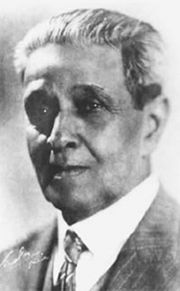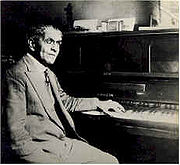
Ernesto Nazareth
Encyclopedia


Brazil
Brazil , officially the Federative Republic of Brazil , is the largest country in South America. It is the world's fifth largest country, both by geographical area and by population with over 192 million people...
ian composer and pianist, especially noted for his creative tango and Choro
Choro
Choro , traditionally called chorinho , is a Brazilian popular music instrumental style. Its origins are in 19th century Rio de Janeiro. In spite of the name, the style often has a fast and happy rhythm, characterized by virtuosity, improvisation, subtile modulations and full of syncopation and...
compositions.Ernesto Nazareth was born in Rio de Janeiro
Rio de Janeiro
Rio de Janeiro , commonly referred to simply as Rio, is the capital city of the State of Rio de Janeiro, the second largest city of Brazil, and the third largest metropolitan area and agglomeration in South America, boasting approximately 6.3 million people within the city proper, making it the 6th...
, one of five children. His mother, Carolina da Cunha gave him his first piano lessons. At the age of ten, after his mother's death, he continued his piano studies with Eduardo Moreira and Lucien Lambert.
Strongly influenced by Chopin, Nazareth published his first composition Você Bem Sabe (1877), at age 14. At this time, he began his professional career playing in cafes, balls, society parties and in the waiting rooms of movie theaters. In 1893, Casa Vieira Machado published his famous "Brejeiro" tango.
In 1907 Ernestp Nazareth was nominated secretary of the National Treasury but refused the position. Instead, he began to teach private piano lessons and was hired as a pianist for Casa Gomes in 1921 and the Odeon Cinema from 1920-1924. In São Paulo and Campinas he performed several shows in the Municipal Theater and at the Conservatory. He was given then a grand piano as a gift from his admirers.
He was one of the first artists to play for the Society Radio of Rio de Janeiro. In 1932 he presented for the first time, a recital in which he performed only his compositions.
Nazareth was noted for creatively combining diverse influences into his music, not only of Brazilian music but also from the music of Europe
Europe
Europe is, by convention, one of the world's seven continents. Comprising the westernmost peninsula of Eurasia, Europe is generally 'divided' from Asia to its east by the watershed divides of the Ural and Caucasus Mountains, the Ural River, the Caspian and Black Seas, and the waterways connecting...
, Africa
Africa
Africa is the world's second largest and second most populous continent, after Asia. At about 30.2 million km² including adjacent islands, it covers 6% of the Earth's total surface area and 20.4% of the total land area...
and ragtime
Ragtime
Ragtime is an original musical genre which enjoyed its peak popularity between 1897 and 1918. Its main characteristic trait is its syncopated, or "ragged," rhythm. It began as dance music in the red-light districts of American cities such as St. Louis and New Orleans years before being published...
. Many of his compositions remain part of the repertory today.
Nazareth composed 88 tangos, 41 waltz
Waltz
The waltz is a ballroom and folk dance in time, performed primarily in closed position.- History :There are several references to a sliding or gliding dance,- a waltz, from the 16th century including the representations of the printer H.S. Beheim...
es, 28 polka
Polka
The polka is a Central European dance and also a genre of dance music familiar throughout Europe and the Americas. It originated in the middle of the 19th century in Bohemia...
s and numerous samba
Samba
Samba is a Brazilian dance and musical genre originating in Bahia and with its roots in Brazil and Africa via the West African slave trade and African religious traditions. It is recognized around the world as a symbol of Brazil and the Brazilian Carnival...
s, galop
Galop
In dance, the galop, named after the fastest running gait of a horse , a shortened version of the original term galoppade, is a lively country dance, introduced in the late 1820s to Parisian society by the Duchesse de Berry and popular in Vienna, Berlin and London...
s, quadrille
Quadrille
Quadrille is a historic dance performed by four couples in a square formation, a precursor to traditional square dancing. It is also a style of music...
s, Schottische
Schottische
The schottische is a partnered country dance, that apparently originated in Bohemia. It was popular in Victorian era ballrooms as a part of the Bohemian folk-dance craze and left its traces in folk music of countries such as Argentina , Finland , France, Italy, Norway , Portugal and Brazil , Spain ...
s, fox-trots, romances and other types of scores, totaling 211 complete compositions.
In 1933, after a period of mental instability, due to the deaths of his wife and daughter and worsening hearing problems (caused by a fall during childhood) Nazareth was hospitalized at the Juliano Moreira Asylum in Jacarepaguá. On February 5, 1934, Nazareth fled the asylum and was found alone three days later in the adjacent forest near a waterfall, dead by drowning.
Catalog of works
- A Bella Melusina
- A Flor de meus Sonhos
- A Florista
- A Fonte do Lambari
- A Fonte do Suspiro
- Adieu
- Adorável
- Ai Rica Prima
- Albíngia
- Alerta!
- Ameno Resedá
- Andante Expressivo
- Apanhei-te cavaquinho
- Arreliado
- Arrojado
- Arrufos
- As Gracinhas de Nhô-nhô
- Até que enfim!
- Atlântico
- Atrevidinha
- Atrevido
- Bambino
- Bambino- Você não me dá! words of Catullo da Paixão Cearense
- Batuque
- Beija-Flor
- Beijinho de Moça
- Bom-Bom
- Brejeira
- Brejeiro
- Byciclette-Club
- Caçadora
- Cacique
- Capricho
- Cardosina
- Carioca
- Catrapuz
- Cavaquinho, Por que Choras?
- Celestial
- Chave de Ouro
- Chile-Brazil
- Comigo É na Madeira
- Confidências
- Coração que sente
- Corbeille de Fleurs
- Correcta
- Crê e Espera
- Crises em Penca
- Cruz, Perigo!!
- Cruzeiro
- Cubanos
- Cuéra
- Cutuba
- Cuyubinha
- De Tarde
- Delightfulness
- Dengoso
- Desengonçado
- Digo
- Dirce
- Divina
- Dor Secreta
- Dora
- Duvidoso
- Elegantíssima
- Elegia para piano (left hand)
- Elétrica
- Elite-Club
- Encantada
- Encantador
- Ensimesmado
- Eponina
- Escorregando
- Escovado
- Espalhafatoso
- Espanholita
- Está chumbado
- Eulina
- Expansiva
- Êxtase (voice, piano and violin)
- Êxtase (piano)
- Exuberante
- Faceira
- Famoso
- Fantástica
- Favorito
- Feitiço
- Ferramenta
- Fetiço não Mata
- Fidalga
- Floraux
- Fon-fon
- Fora dos Eixos
- Furinga
- Garoto
- Gaúcho
- Gemendo, Rindo e Pulando
- Genial
- Gente, o Imposto Pegou?
- Gentil
- Gotas de ouro
- Gracietta
- Guerreiro
- Helena
- Henriette
- Hino a Alaor Prata
- Hino a Carneiro Leão
- Hino a Pereira Passos
- Hino da Escola Ester Pedreira de Mello
- Hino da Escola Floriano Peixoto
- Hino da Escola Pedro II
- Ideal
- If I Am Not Mistaken
- Improviso (Concert Study)
- Insuperável
- Ipanema
- Iris
- Jacaré
- Jangadeiro
- Janota
- Julieta ('quadrilha', a typical Brazilian popular dance)
- Julieta (valse)
- Julita
- Labirinto
- Laço Azul
- Lamentos
- Magnífico
- Mágoas
- Maly
- Mandinga
- Marcha Fúnebre
- Marcha Heróica aos Dezoito do Forte
- Mariazinha Sentada na Pedra
- Marietta
- Matuto
- Meigo
- Menino de ouro
- Mercedes
- Mesquitinha
- Myosótis
- Não Caio n'Outra!
- Não me Fujas Assim
- Nazareth
- Nenê
- Nenê - words of Catullo da Paixão Cearense
- No Jardim
- Noêmia
- Noturno
- Nove de Julho
- Nove de Maio
- O Alvorecer
- O Futurista
- O nome Dela (polca)
- O Nome dela (valse)
- O que Há
- O Teus Olhos Cativam
- Odeon
- Onze de Maio
- Orminda
- Ouro Sobre Azul
- Pairando
- Paraíso
- Paraíso
- Pássaros em Festa
- Paulicéa como És Formosa!
- Perigoso
- Pierrot
- Pingüim
- Pipoca
- Pirilampo
- Plangente
- Plus Ultra
- Podia ser Pior
- Polca para a Mão Esquerda (left hand)
- Polonaise
- Por que sofre?
- Primorosa
- Proeminente
- Quebra-Cabeças
- Quebradinha
- Ramirinho
- Ranzinza
- Rayon d'Or
- Reboliço
- Recordações do Passado
- Remando
- Resignação
- Respingando
- Ressaca
- Retumbante
- Rosa Maria
- Sagaz
- Salve, Salve, Nações Unidas
- Sarambeque
- Saudade
- Saudade dos Pagos
- Saudades e Saudades!
- Segredo
- Segredos da Infância
- Sentimentos d'Alma
- Soberano
- Suculento
- Sustenta a ...nota...
- Sutil
- Talismã
- Tenebroso
- Thierry
- Topázio Líquido
- Travesso
- Tudo Sobe...
- Tupinambá
- Turbilhão de Beijos
- Turuna
- Vem Cá, Branquinha
- Vésper
- Victória
- Vitorioso
- Você bem Sabe
- Xangô
- Yolanda
- Zênite (authored by Maestro Gaó)
- Zica
- Zizinha
External links
- Free complete scores in PDF format
- Free recordings in MP3 format by various pianists at PianoSociety.com
- Beatriz Kauffmann's Web Site - Músicas de Ernesto Nazareth em arquivos MIDI (Portuguese language)
- CD-ROM of Ernesto Nazareth - King of Choro
- Bio and discography on AllBrazilianMusic.com, includes audio clips
- Ernesto Nazareth - Rei do Choro
- Rare Music of Ernesto Nazareth (music, text, images)

